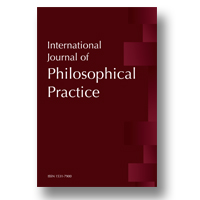|
|
|
1.
|
International Journal of Philosophical Practice:
Volume >
2 >
Issue: 4
Maria daVenza Tillmanns
Philosophical Counseling:
Understanding the Unique Self and Other through Dialogue
abstract |
view |
rights & permissions
| cited by
Many philosophical counselors seem to be counselors who use or point to philosophical texts or use abstract indeed logical or rational methods when working with a client. I want to introduce the idea of a counseling philosopher, who uses the client’s own concrete experiences as the basis for philosophizing with the client about the nature of the client’s dilemma - using ‘the between’ (Buber) as that special creative space where one employs the art of philosophizing to the unique situation. Otherwise, the particularity of that client gets subsumed under theory or methods, much like what has happened in psychology and which gave rise to Achenbach’s criticisms of psychology/psychiatry. The dialogical of which Buber and Friedman speak is the give and take between client and counseling philosopher of understanding and expanding perceptions confirmed through the actual relationship. Philosophy as an art (and not a method) helps us restore the trust Buber talks about which allows us to engage the world directly and not through categories of thought grounded in psychological or philosophical texts and theories.
|
|
|
|
|
|
|
2.
|
International Journal of Philosophical Practice:
Volume >
2 >
Issue: 4
Elliot D. Cohen
Absolute Nonsense:
The Irrationality of Perfectionistic Thinking
abstract |
view |
rights & permissions
| cited by
This paper shows how Logic-Based Therapy can constructively employ philosophical theories (such as those of Augustine, Aquinas, Spinoza, Hume, and Epictetus) as potent antidotes to the fallacy of Demanding Perfection.
|
|
|
|
|
|
|
3.
|
International Journal of Philosophical Practice:
Volume >
2 >
Issue: 4
Bruce W. Fraser
Comments on Elliot Cohen’s “Absolute Nonsense: The Irrationality of Perfectionist Thinking”
abstract |
view |
rights & permissions
| cited by
These comments on Cohen’s paper (IJPP, this issue) focus on the question of whether Cohen’s attempt to derive antidotes from incompatible or contradictory philosophical camps— such as Hume’s subjective theory of beauty, on the one hand, and Augustine’s objectivist account—present a fatal problem for Cohen’s LBT. The paper concludes with suggesting a constructive way around the problem.
|
|
|
|
|
|
|
4.
|
International Journal of Philosophical Practice:
Volume >
2 >
Issue: 4
Samuel Zinaich, Jr.
Janet Staab on Philosophical Coaching as Engaged Pedagogy
abstract |
view |
rights & permissions
| cited by
In this essay, I critically analyze Janet Staab’s view of engaged pedagogy, as a basis for philosophical coaching. I argue that Staab’s approach fails to address two major issues faced by counselors within a counseling context. First, Staab’s position does not appreciate the need for an appropriate psychical distance between coach and client, one needed to understand the client’s problems. Second, although Staab addresses the need to handle conflicts that may arise between coach and client, her viewpoint does not recognize the value of how it is possible to empower the client even if the choices and outlooks of the client clash with the coach’s own values.
|
|
|
|





